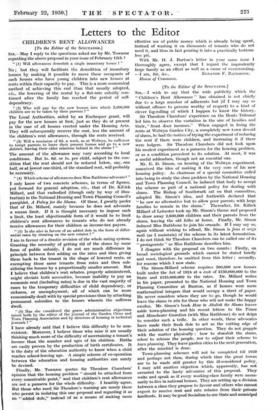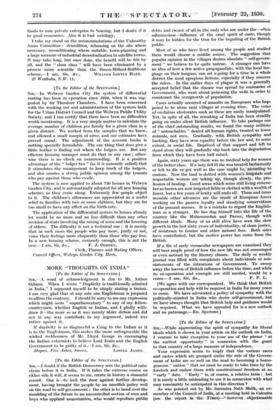[To the Editor of the SPECTATOR.] SIR,—I wish to say
that the wide publicity which the " Children's Rent Allowance " has obtained is not chiefly due to a large number of adherents but (if I may say so without offence to persons worthy of respect) to a kind of clever log-rolling of which I happen to know the history.
Sir Theodore Chambers' experience on the Rents Tribunal led him to observe the variation in the size of families and their." front door incomes." When engaged in fixing the rents at Welwyn Garden City, a completely new town devoid of slums, he had the notion of trying the experiment of reducing the rent if there were children, and increasing it if there were lodgers. Sir Theodore Chambers did not look upon his modest experiment as a panacea for the housing problem, Or as a condition precedent to its solution. At most, it was a useful addendum, though not an essential one.
Mr. E. D. Simon, on hearing of the Welwyn experiment, conceived the idea of making it. the very core of his new housing policy. As chairman of a special committee called into being to study the slum problem by the National Housing and Town Planning Council, he induced that body to accept the scheme as part of a national policy for dealing with shuns. The Bishop of Southwark sat on that committee, adopted Mr. Simon's idea, and forthwith declared that " he saw no alternative but to allow poor parents with large families to remain in the slums." Thereafter, Dr. Killick Millard of Leicester took up Mr. Simon's theme and proposed to draw away 2,000,000 children and their parents from the slums, leaving the old folks at home. Finally,. Mr. Simon induced Miss Rathbone to join his crusade. If I may say so, again without wishing to offend, Mr. Simon is fons et origo mali (as I maintain) of the scheme in its latest formulation. I do not think Sir Theodore Chambers can be called one of its " protagonists " as Miss Rathbone describes him.
I disagree with the proposal on two counts : Firstly, on broad sociological grounds which cannot be stated briefly and must, therefore, be omitted from this letter ; secondly, for reasons which I now state.
The Simon-Millard scheme requires 500,000 new houses built under the Act of 1924 at a cost of £150,000,000 to the State and £125,000,000 to the rates. Dr. Millard writes in his paper, presented to the National Housing and Town Planning Committee at Buxton, as if houses were mere mathematical integers that would occupy a sheet of paper. He never considers where they are to go, though he would leave the slums in situ for those who will not make the happy exodus. Mr. Simon's book How to Abolish the Slums leaves aside town-planning and his recent letters to the Times and Manchester Guardian (with Miss Rathbone) do not deign to consider such a trifle. In other words, these advocates have made their fresh dole to act as the cutting edge of their solution of the housing question. They do not grapple with the matter physically : how to demolish the shuns, where to rehouse the people, nor to adjust their scheme to town planning. They leave garden cities to the next generation, after the mischief is done.
Town-planning schemes will not be completed till 1989 and perhaps not then, during which time the great towns are to be made still greater by this ill-considered policy. I. may add another objection .which, apparently, has not occurred .to the hasty advocates of this proposal. They write and speak as if every working-class family were neces- sarily to live in national houses. They are setting up a division between a class they_propose to favour and others who cannot expect to receive rent and rate rebates from their private landlords. It may be good Socialism to use State and municipal funds to ruin private enterprise In 'lousing, but I-doubt if it be good economics. Also it is had sociology: I take my stand on the recommendations of the Unhealthy Areas Committee : demolition, rehousing on the site where necessary, reconditioning where suitable, town-planning and a large measure of industrial decentralization to satellite towns. It may take long, but once done, the benefit will be felt by all, and the " slum class " will have been eliminated by a process more scientific than the Simon-Millard-Rathbone











































 Previous page
Previous page